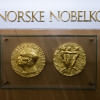Nobel prizes for AI researchers raise concerns about prize categories

The recent awarding of Nobel Prizes in chemistry and physics to Google-affiliated AI pioneers has sparked controversy, raising questions about Big Tech's growing influence in cutting-edge research and whether the Nobel Prize categories adequately reflect modern scientific breakthroughs, according to a recent report by Reuters.
Demis Hassabis and John Jumper, both from Google's DeepMind, along with US biochemist David Baker, were awarded the Nobel Prize in Chemistry for their groundbreaking use of artificial intelligence to decode microscopic protein structures. This advancement is expected to have a profound impact on medical research, from drug development to disease understanding. Geoffrey Hinton, often called the 'godfather of AI' and a former researcher at Google, won the Nobel Prize in Physics for his pioneering work in machine learning, a field that has paved the way for today's AI-driven innovations. He shared the award with US physicist John Hopfield for earlier discoveries that laid the foundation for AI.
What do experts think?
The recognition of AI breakthroughs in traditional Nobel categories has stirred debate, suggests the Reuters article. Critics argue that the lack of Nobel Prizes for computer science or mathematics forces the committee to place AI achievements into existing fields like physics or chemistry, even when they don't neatly fit. "The Nobel committee doesn't want to miss out on AI, so it's very creative of them to push Geoffrey through the physics route," said Professor Dame Wendy Hall, a computer scientist and AI advisor to the United Nations. She added that while Hinton's and Hassabis's work is undoubtedly worthy of recognition, it raises the question of how best to reward breakthroughs in emerging fields that don't align with Alfred Nobel's original categories.
Noah Giansiracusa, a mathematics professor at Bentley University, expressed similar concerns. "What Hinton did was phenomenal, but was it physics? I don't think so." According to him, while Hinton was inspired by physics, he did not develop a new theory in physics or solve longstanding physics-related problems. This mismatch, according to experts, reflects the limitations of the Nobel Prize framework, which was established in the 19th century and hasn't evolved to include fields like computer science or data science.
Big Tech's role in shaping modern research
Beyond the debate over Nobel Prize categories, the awards have reignited broader concerns about Big Tech's increasing control over scientific research. Companies like Google, with vast resources and financial backing, have outpaced traditional academic institutions in AI research and publications. This raises questions about whether the future of scientific discovery will be dominated by profit-driven corporations rather than publicly funded universities, according to the Reuters report.
Hinton himself has expressed concerns about this very issue. After leaving Google in 2023, he warned about the potential dangers of unchecked AI development. "AI could surpass human intelligence sooner than we expect, and I don't have a clear answer for how we stop it from spiralling out of control," Hinton said during a press conference after receiving the Nobel Prize.
Hinton's departure from Google was fueled by his growing discomfort with how AI could be misused, despite the responsible stance he credits Google with maintaining. His remarks echoed the sentiments of other AI researchers who worry about the direction of the industry. They fear that the race for AI dominance is being driven less by scientific curiosity and more by the enormous profits Big Tech companies stand to gain from deploying AI tools, such as chatbots or algorithm-driven advertising systems.
The need for public investment in research
The rise of Big Tech's influence in AI research also underscores the need for more public investment in science, according to experts like Giansiracusa. "So much of Big Tech is not oriented towards the next deep-learning breakthrough, but making money by pushing chatbots or putting ads all over the internet," he noted. While there are still pockets of innovation, the commercial priorities of large companies like Google threaten to overshadow purely scientific endeavours.
For academia, the challenge is clear: universities and publicly funded institutions struggle to compete with the resources and pace of Big Tech. With Google, OpenAI, and other companies racing ahead, many fear that traditional institutions will be left behind, unless governments step in to provide more robust support for independent research. This could ensure that the future of AI, and science in general, remains a balanced effort between private and public sectors, rather than skewed heavily toward profit, suggests the Reuters article.
Time for new Nobel categories?
As AI continues to reshape industries and society, calls for the Nobel Prize committee to establish new categories—such as computer science or AI—are growing louder. "These scientists deserve recognition, but the committee needs to modernise," said Professor Hall in the Reuters report. With technological advancements at the forefront of today's global challenges, experts argue that the Nobel framework needs to reflect the rapid changes in scientific disciplines that have emerged since the original prizes were established.
The debate surrounding the recent Nobel awards isn't just about Big Tech's dominance or the boundaries of physics and chemistry; it's also a reflection of how science itself is evolving in the 21st century. If the Nobel Prizes are to continue being seen as the pinnacle of achievement, many believe the criteria and categories must evolve to acknowledge the breakthroughs in AI, computer science, and other fields that are shaping the future.

 For all latest news, follow The Daily Star's Google News channel.
For all latest news, follow The Daily Star's Google News channel. 








Comments